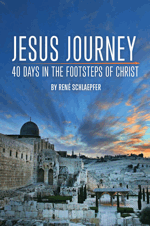Day 34
In The Pits
Read Matthew 26:56–74
Our group bunches together in a cold, dark dungeon believed to have been part of the High Priest Caiaphas’ house. It’s here, or very near to this place, that Jesus was held overnight before being taken to Pilate for sentencing.
Excavations at this site, now known as the Church of St. Peter in Gallicantu, have unearthed the remains of a large mansion apparently connected to the Jerusalem priesthood: There are servants’ quarters, indicating the house was owned by a wealthy family, and a complete set of weights and measures used by the priests in the Temple, along with a door lintel inscribed with the word “Korban” (sacrificial offering), showing this was a priest’s residence.
It’s a little creepy to realize that, in addition to implements used in religious ritual, this priest’s mansion also contained a dungeon. Clearly the priestly families of the time had a lot of status, and the power to protect it.
There’s a guardroom one floor above us, with wall fixtures to which prisoners were chained. In the middle of the room are pillars with holes to fasten prisoners’ hands and feet for flogging.
On one side of the guardroom there’s a pit into which captives were lowered with rope. Originally this vertical shaft was the only way in or out of the dungeon; today we walked down narrow steps to get to the place Christ may have been held for questioning.
THE DARKEST DEPTHS
In the dungeon I ask the group to stand in silence and imagine the feelings of Jesus, here in a dark pit, abandoned by even his closest companions.
I notice that the Christian priests who now own this site have left a Bible in the pit, opened to Psalm 88. On that night, in this place, Jesus may have remembered the very words I now read aloud to our group:
I am overwhelmed with troubles
and my life draws near to death.
I am counted among those who go down to the pit;
I am like one without strength.
You have put me in the lowest pit,
in the darkest depths.
You have taken from me my closest friends
and have made me repulsive to them.
I am confined and cannot escape;
my eyes are dim with grief.
Why, Lord, do you reject me
and hide your face from me? Psalm 88:3, 4, 6, 8, 9, 14
Can you relate?
Every night this prayer is prayed. From lonely apartments or hospital beds or jail cells or street corners.
I am confined and cannot escape;
my eyes are dim with grief.
And Jesus felt the same way.
IN THE PITS WITH JESUS
We often make the mistake of thinking Christ was detached and serene during his trial and crucifixion. Maybe we’d rather imagine him that way, but the Bible describes Jesus experiencing pain and rejection and loneliness just as intensely as any other human being. He was the Son of God, but he was also 100% human. He was in the pits, in every way.
That means when you’re in the pit, you’ll find Jesus there. He gets it. He knows the ache of betrayal, the agony of loneliness.
And above him, in the courtyard, his own disciple Peter was about to inflict more pain.
Betrayed By a Friend
Jerusalem nights can be cold. The city sits 2,400 feet above sea level and gets cool breezes at night. There are snow flurries every year. So the high priest’s servants make a charcoal fire to warm themselves.
Peter probably figures he’ll be safe from detection in the dim firelight, but even there his appearance and northern accent give him away, and a servant girl accuses him of being a Galilean Christ-follower.
And this rough, tough fisherman who once swore he would never, ever leave Jesus sees his resolve crumble — not before the expert tortures of the Roman soldiers but the simple taunts of a servant.
He vows with an oath that he never knew Christ (and he’s a fisherman, so he knows his oaths!). And maybe he is telling the truth in a way, revealing exactly how he felt: “I never really knew him.”
It must have seemed like his world was crumbling all around him, that it was all over now, that Jesus was just like any other bug squashed by the jackboots of the Roman bureaucracy. And Peter’s betrayal adds to Christ’s despair.
You have taken from me my closest friends
and have made me repulsive to them.
HE GETS IT
The Messiah, Jesus taught, had to suffer and die — and be resurrected (Luke 24:46). Not just die. But suffer and die.
Why? While the resurrection reveals God’s triumph, the sufferings of Christ show that he can truly sympathize with your pain.
Remember what the angel said Jesus would be called? God with us. In Jesus we see God with us all the way, all the way through the experiences of injustice and suffering and death.
We do not have a high priest who is unable to sympathize with us in our weakness, but he has been tempted in every way as we are, yet without sin. Hebrews 4:15
Jesus is a high priest who can sympathize. He was born in obscurity. He was poor, misunderstood, tempted, lied to, lied about, betrayed, beaten, spat upon, slandered, disowned, despised, abandoned, tortured, killed.
No matter what your circumstances, Jesus relates to you. There is sympathy. Aren’t you glad?
He was not a Messiah who rode into town as an invulnerable superhero, a Man of Steel who felt no pain. He was something better: He was one of us, one of the very least of us, all the way from his birth in a manger to his unjust suffering to his unfair death sentence.
If you’re going through tough, confusing, unfair, painful times, remember the very symbol of faith in Christ.
It’s not a sword. It’s not a treasure chest. It’s not a dollar sign. It’s not a flag.
It’s a cross.
Jesus gets it. And while he promises you will not stay in the pit, that there is a resurrection on the other end, in the meantime, he will be God with you through it all.
Prayer
Thank God today that Jesus gets it. Share with him a dark struggle, knowing he will sympathize.

 Buy Jesus Journey at Amazon.com
Buy Jesus Journey at Amazon.com